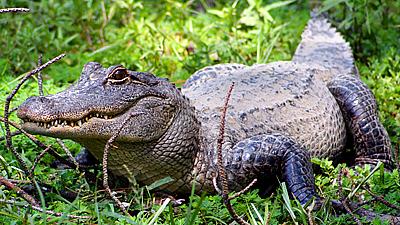Alligator
 [American Alligator Alligator mississippiensis |
Chinese Alligator Alligator sinensis]
[American Alligator Alligator mississippiensis |
Chinese Alligator Alligator sinensis]
Here we have a case where who eats and who is eaten is unusually
interchangeable. It pays to be alert and careful when hiking in
Alligator territory.
Alligators are now known not to be reptiles, but related to birds
through a common dinosaur ancestor. Nonetheless, we're listing them
here under "reptiles" rather than under "birds", because this is where
most people would expect to find them.
American alligators are found in the southeast of the U.S. from North
Carolina down and around Florida to the coastal areas of Texas, but most
live in Florida and Louisiana. The largest alligator on record was over
19 feet but they are commonly around 8 feet.
While the American Alligator is doing well and is also extensively
farmed, the Chinese alligator lives only along the Yangtze River and is
endangered. In the U.S. alligator has been harvested primarily for hides
but the meat is becoming increasingly popular.
Photo © i0102
More on Reptiles & Amphibians.
 No, Alligator doesn't taste "just like chicken", but close enough to
chicken thighs that recipes calling for alligator should work well
enough with them. Perhaps wigh a little marinade of Thai fish sauce.
Young alligator (the only kind available around here) leg meat is a
little milder than chicken thighs but has more flavor than breast,
and it's less tough and stringy than chicken. The photo to the left is
of Alligator Tail Meat (previously frozen).
No, Alligator doesn't taste "just like chicken", but close enough to
chicken thighs that recipes calling for alligator should work well
enough with them. Perhaps wigh a little marinade of Thai fish sauce.
Young alligator (the only kind available around here) leg meat is a
little milder than chicken thighs but has more flavor than breast,
and it's less tough and stringy than chicken. The photo to the left is
of Alligator Tail Meat (previously frozen).
I've found that frozen alligator meat (again, the only kind available
around here) exudes a lot of juices when fried. The juices coagulate on
the pan and form a thick brown coating which would burn before the pieces
of meat were browned. You could probably brown alligator by par boiling
it for a couple of minutes, cooling, drying and then frying, but
browning isn't necessary for most recipes.
Buying:
Alligator meat is not yet common in much of
the U.S., but in Los Angeles I've found it occasionally in large Asian
markets serving a mixed Chinese and Vietnamese community, and it is
also stocked by Harmony Farms, the exotic meat market down the street
from me. The tail meat pictured to the left cost 2019 US $23 / pound.
rp_alliz 061111 r 190530 - www.clovegarden.com
©Andrew Grygus - agryg@clovegarden.com - Photos
on this page not otherwise credited © cg1
- Linking to and non-commercial use of this page permitted
 No, Alligator doesn't taste "just like chicken", but close enough to
chicken thighs that recipes calling for alligator should work well
enough with them. Perhaps wigh a little marinade of Thai fish sauce.
Young alligator (the only kind available around here) leg meat is a
little milder than chicken thighs but has more flavor than breast,
and it's less tough and stringy than chicken. The photo to the left is
of Alligator Tail Meat (previously frozen).
No, Alligator doesn't taste "just like chicken", but close enough to
chicken thighs that recipes calling for alligator should work well
enough with them. Perhaps wigh a little marinade of Thai fish sauce.
Young alligator (the only kind available around here) leg meat is a
little milder than chicken thighs but has more flavor than breast,
and it's less tough and stringy than chicken. The photo to the left is
of Alligator Tail Meat (previously frozen). [American Alligator Alligator mississippiensis |
Chinese Alligator Alligator sinensis]
[American Alligator Alligator mississippiensis |
Chinese Alligator Alligator sinensis]